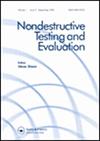共面电容传感器及其在无损检测中的应用综述
IF 3
3区 材料科学
Q2 MATERIALS SCIENCE, CHARACTERIZATION & TESTING
引用次数: 4
摘要
与传统的射线照相、超声、磁粉探伤、涡流等无损检测技术相比,共面电容感测技术是一种新兴的、具有广阔发展前景的技术。为了展示共面电容式传感器(CCSs)在濒死体验中的能力,本文利用现有的相关文献,对使用共面电容式传感器的电容式濒死体验技术进行了系统的概述。本文将重点介绍该技术的基本原理、影响传感器性能的因素、用于缺陷检测的CCSs的现有设计,最后介绍CCSs在无损检测的不同领域中的缺陷检测应用。讨论了CCS技术存在的挑战和未来的发展前景。在普遍存在的挑战中,从CCSs获得更好的性能主要是通过使用不同的几何设计来实现的,但很少强调优化电路设计和传感器组件材料的选择。优化传感器性能的关键在于建立权衡之间的平衡。与传统的NDE技术相比,该技术的各种优势允许不同的应用,并证明了该技术在未来的新应用中的潜力。本文章由计算机程序翻译,如有差异,请以英文原文为准。
Coplanar capacitive sensors and their applications in non-destructive evaluation: a review
ABSTRACT Compared with conventional non-destructive evaluation (NDE) techniques, such as radiography, ultrasound, magnetic particle inspection and eddy current, the coplanar capacitive sensing technique is a newly emerging technique with promising future prospects. Aiming to show the capabilities of coplanar capacitive sensors (CCSs) for NDE, this review paper exploits existing literature on the subject to provide a general systematic overview of the capacitive NDE technique using CCSs. This review focuses on the fundamentals of the technique, factors affecting sensor performance, existing designs of CCSs used for defect detection and finally, the different applications of CCSs for defect detection in different fields of NDE. The existing challenges and future prospects of the CCS technique are also discussed. Amidst the prevalent challenges, obtaining better performance from CCSs has been mostly done by using different geometric designs, but less emphasis has been put on optimising circuit design and choice of sensor component materials. The key to optimisation of sensor performance is rooted in establishing a balance among trade-offs. The various advantages of the technique, compared to conventional NDE techniques, allow for different applications and attest to the potential of the technique for new applications in the future.
求助全文
通过发布文献求助,成功后即可免费获取论文全文。
去求助
来源期刊

Nondestructive Testing and Evaluation
工程技术-材料科学:表征与测试
CiteScore
4.30
自引率
11.50%
发文量
57
审稿时长
4 months
期刊介绍:
Nondestructive Testing and Evaluation publishes the results of research and development in the underlying theory, novel techniques and applications of nondestructive testing and evaluation in the form of letters, original papers and review articles.
Articles concerning both the investigation of physical processes and the development of mechanical processes and techniques are welcomed. Studies of conventional techniques, including radiography, ultrasound, eddy currents, magnetic properties and magnetic particle inspection, thermal imaging and dye penetrant, will be considered in addition to more advanced approaches using, for example, lasers, squid magnetometers, interferometers, synchrotron and neutron beams and Compton scattering.
Work on the development of conventional and novel transducers is particularly welcomed. In addition, articles are invited on general aspects of nondestructive testing and evaluation in education, training, validation and links with engineering.
 求助内容:
求助内容: 应助结果提醒方式:
应助结果提醒方式:


